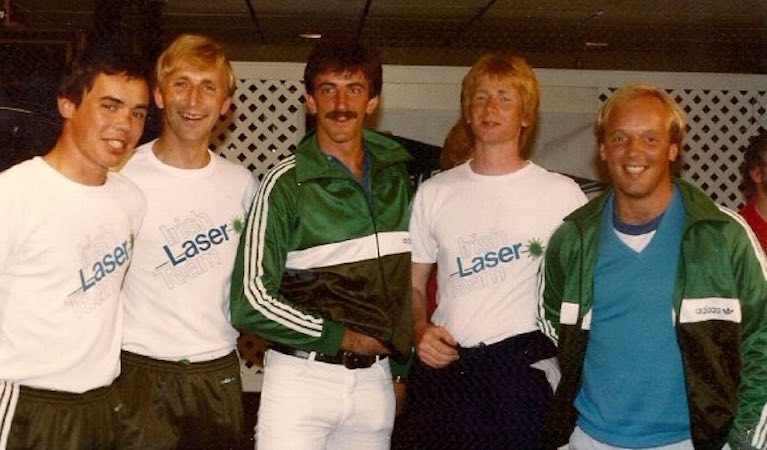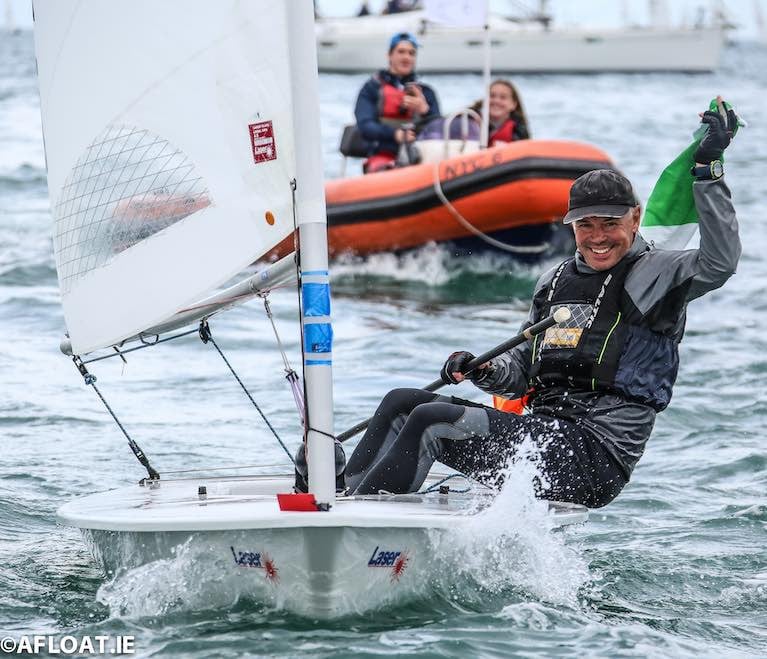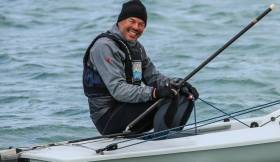Displaying items by tag: Mark Lyttle
Mark Lyttle’s devotion to the Laser/ILCA class is truly world league, as he has continued to race the boat for decades, from success at junior level right up to becoming World Grand Master Champion on Dublin Bay in 2018. There’s no sign of letup, as February’s ILCA World Masters in Australia saw him regularly on the podium, and he finished a sunlit but extremely demanding series with the Bronze in the main division to make him an Afloat.ie “Sailor of the Month”.
National Yacht Club's Mark Lyttle Stays Second at ILCA 7 Grand Masters World Championships in Mexico
The National Yacht Club's Mark Lyttle stays second going into the final two races of the 2022 ILCA 7/Laser Grand Masters World Championships in Mexico.
Canadian Allan Clark won the first race of the day – as a typical ILCA 6 sailor, the lighter wind suited him. The fleet’s leader of the week, Australian Brett Beyer, won the second race and continues to hold first overall. Ireland’s Mark Lyttle still sits in second and Spain’s Jose Maria Van Der Ploeg in third.
Two final races are scheduled for Tuesday.
For full results, see here
Ireland's Mark Lyttle Lying Second at ILCA/Laser Grand Master World Championships in Mexico
The National Yacht Club's Mark Lyttle is going well at the 2022 ILCA 7 Masters World Championships in Mexico this weekend.
After six races sailed and one discard to count, the 1996 Atlanta Olympian is two points off the lead in a 24-boat fleet.
The venue is the same as where Lyttle's clubmate Finn Lynch sailed to his second top ten at the ILCA Worlds late last month.
If the Dun Laoghaire sailor, who is based in the UK, is to reclaim his Grand Master World title in 2018 on home waters, he will need to dislodge all-around Masters legend Brett Beyer of Australia.
Beyer has just graduated from the 45-55 category and has four race wins in his score tally at the halfway point. He previously won seven Laser Apprentice Masters World Championships between 2001 and 2010.
Saturday was a reserve day at Vallarta Yacht Club, with racing scheduled to resume on Sunday running until Tuesday.
Results are here
Even in a pandemic-shortened season like 2021, by the time October is reached, some Afloat.ie "Sailor of the Month" award winners from earlier months are achieving further success. At year's end, these new successes are gathered in with their earlier achievements to add further lustre to their previous winning profiles in order to intensify the process of selecting a "Sailor of the Year". Meanwhile, as each month comes round, this approach clears the way for fresh names to come to the fore, and in October 2021's special circumstances, our latest listing of "Sailors of the Month" reflects this.
 In for the long haul - the multi-talented Ger Owens Photo: Bob Bateman
In for the long haul - the multi-talented Ger Owens Photo: Bob Bateman
Ger Owens of Royal St George YC is "Sailor of the Month" for October
While some helms have won the All-Ireland Championship two or even three times within a relatively short time-span, none can match Ger Owens' unique achievement of having a 21-year-gap between his two victories. He was a rising star when he first took it in 2000, having won the Juniors in 1996 & 1998. And with today's greatly increased longevity, he still is a rising star. Most of his achievements in recent years have been in the GP 14s, but he has proven more than able in several classes Thus when the All-Ireland 2021 was staged in National 18s in Crosshaven at the beginning of October, he was soon at home in the class, taking the overall win in the Championship of Champions despite a trio of longtime National 18 sailors being in the lineup against him.
Olympic Sailor Mark Lyttle Pays Tribute to Laser Legend Bill O'Hara OBE
2018 Laser Grand Master World Champion and 1996 Olympian Mark Lyttle reflects on a lifetime sailing against his old rival and great friend Bill O'Hara, who was awarded an OBE in the Queen's New Year's Honours List 2021.
I first recall Bill at the 1978 Pimm's Irish Lasers Nationals at Lough Ree Yacht Club (actually sailed from Hodson Bay and yes, they did sponsor the Irish Laser class) but it wasn't on the race course. As a 15-year-old sailing what we now call a Standard rig as that's all there was, I was nowhere near the front of the fleet especially as a hurricane passed through during the regatta. But I do remember Bill was the centre of social activities ashore as a young university student.
Over the next couple of seasons, Bill emerged as one of the top Lasers sailors along with Gordon Maguire (turned professional skipper), Dave Cummins (twice all Ireland champion) and Colin Galavan. Following a fifth place in the light air Kinsale Nationals (1979) and the curtailed (with another gale) Dun Laoghaire Nationals (1981), Bill took the Irish titles in Ballyholme (1981 where I recall driving to the event in a Renault 5 with three Lasers) and Galway Bay (1982 with Australian and NZL visitors following us home after our extensive continental European tours).
But I remember the 1982 season as my first Laser Europeans, in Athens, where I stayed with Bill and Simon Brien (Dragon Edinburgh Cup winner from Royal North of Ireland YC) and was supported and encouraged all the way by Bill – a true mentor figure.
Bill sailed a brilliant regatta, coming second overall behind the even more brilliant Peter Vilby, a result that has never been beaten by an Irish Laser (Standard) sailor. Consistent with many other Laser sailors across the world in that era, Bill had to realise his Olympic dreams away from Lasers, in his case in the single-hander Finn class.
 Some of the 1982 Irish Laser Class supremos, with their mentor Ron Huthcieson on right, are (left to right) Simon Brien (later multiple Edinburgh Cup winner and other majors), multiple champion Charlie Taylor (still at it in the Laser Masters), Olympian Bill O'Hara, and Dave Cummins, All-Ireland Helmsmans Champion 1981 and 1982
Some of the 1982 Irish Laser Class supremos, with their mentor Ron Huthcieson on right, are (left to right) Simon Brien (later multiple Edinburgh Cup winner and other majors), multiple champion Charlie Taylor (still at it in the Laser Masters), Olympian Bill O'Hara, and Dave Cummins, All-Ireland Helmsmans Champion 1981 and 1982
I recall stories of him campaigning the Finn with Terry Nielsen (1982 Laser World Champion and eventual Bronze Medal winner) in 1983 in North America in the build-up to the Los Angeles Games in 1984.
Like many Olympic campaigners he returned for the Laser Worlds in Gulfport, Mississippi in October 1983 along with Frank Glynn, Con Murphy (better known now as Annalise's dad), John Simms and me. Most of us Irish stayed with nuns in a convent nearby but that is not what we most remember of the regatta. It was a no discard 14 race series in which Bill was doing brilliantly until a protest by the Jury for his boom allegedly hitting a NZL boat on his outside at the gybe mark. Both were disqualified and Bill ended the regatta knowing he would have been World Champion but for that.
It is often said that Juries stopped protesting boat on boat incidents because of that.
Bill went on to race at the Olympics and recorded a 4th, 10th, 9th and 8th in the first four of seven races and finished 13th overall in a very competitive fleet with sailing legends Russell Coutts and John Bertrand winning Gold and Silver. But Bill affirmed his status as role model and great supporter of Irish dinghy sailing by returning from the glories of the Olympics to race in the Irish Laser Nationals at the end of that summer.
 These days Bill O'Hara is an international race judge and race officer
These days Bill O'Hara is an international race judge and race officer
Of course, he was the man we all strived to beat at that event and subsequent seasons in the Laser (he didn't win that one but did win the Irish title three times in the nineties). I remember many great battles around the race course with Bill often ahead at the windward mark with his superior upwind speed and me trying to overtake him by the leeward mark with my superior downwind speed. Bill continued to combine his Laser and Finn sailing through the 1988 Games in Seoul, where he was joined by Peter Kennedy, the 1986 Irish Laser Champion, as David Wilkin's Flying Dutchman crew.
 Afloat's 1983 Laser World's report from Gulfport, Mississippi
Afloat's 1983 Laser World's report from Gulfport, Mississippi
Many of us were envious of that given the limited opportunities to access Olympic sailing in those days but that changed with the introduction of the Laser in the 1996 Olympics. Although Bill started off as a competitor in the search for the single Irish place in Atlanta, he still provided advice and encouragement to me all the way. That is the thing about Bill, a fearsome competitor afloat but a true friend ashore. Nothing supports that more than in the 1994 Irish Laser Nationals when going into the deciding last race where I had a slender lead over Gary McCarthy, I had broken my tiller extension and Bill offered me his with the words "this title needs to be earned not won by default" - sorry Gary. Bill went to the 1996 Games as a coach and provided me with vital advice and encouragement throughout the Games.
Although our interaction has been more social than on the race course in recent years, I look back and say he has been a true motivator and influencer on my sailing journey but more importantly a true friend, which like many friendships based on so many years of shared experiences and the ups and downs of competition, will remain despite the passing of time. Bill is a man who knows loyalty and integrity and I am proud to be his friend. Well done, Bill on your OBE.
Irish Laser Champion Mark Lyttle on Podcast
Ireland's 2018 Laser Grand Master World Champion Mark Lyttle reveals the depth of his ambitions in the solo Laser class when he interviewed for a UK Laser Class podcast recently.
One of the most fascinating statistics in the hour-long chat with Ben Flower of the UK Laser class is that in 1996, Laser sailing had the most nations competing of any sport at the Atlanta Olympics.
As long time Afloat readers will know, Savannah is where the Laser made its Olympic debut and where Lyttle was a race winner, a result that led him to the inaugural Afloat Sailor of the Year award
It's not the only blast from the past contained in the podcast either where Lyttle gives plenty of anecdotes about the 2018 Worlds on Dublin Bay and his homecoming win. A really nice progression in his sailing career from Olympics into masters.
The London based sailor gives some great description of laser campaigning in the 80s; no coaches, just a bunch of lads taking their Lasers off to Europe for the Summer.
There's an interesting account of how old long races have given way to shorter races and how this puts huge emphasis on the run and downwind technique, since the run can be straight after the first beat and so fleet stays so compressed compared to old big triangles when the run was at the end (I assume they did triangle, sausage or triangle, triangle, sausage)
Significantly, as a former chairman of the UK Optimist class, and the architect of the modern Irish Olympic programme, Lyttle speaks about his experiences with youth burnout in sailing.
Listen in to the podcast below:
Mark Lyttle, Olympic Sailor at Atlanta in 1996 when he won a race in the Laser’s first outing in its very effective career as an Olympic boat in addition to its myriad other duties worldwide, has continued his love affair with great little boat by winning the World Title in the Grand Masters Division (ages 55-65) in the Laser Masters Worlds in September at Dun Laoghaire, a magnificent event which attracted 302 entries. Lyttle’s win was particularly popular – in a long sailing career, he has put even more back into sport than he has taken from it.
































































